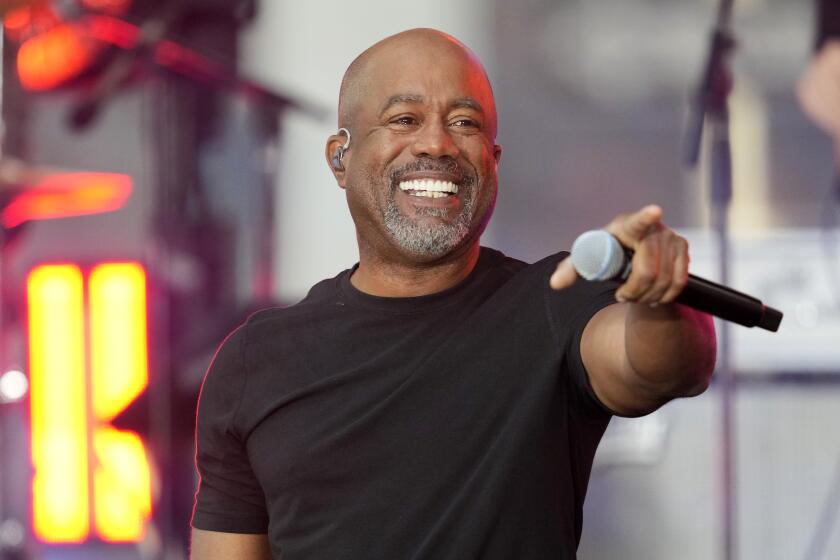COMPANY TOWN : Warner Meeting Arrives on Low Note
There’s a dark cloud hovering over Time Warner’s annual music convention, which gets underway Wednesday in Washington.
Given all the chest beating that usually goes on at conventions, executives are naturally expected to put a happy face on the company’s future. But, in fact, the upbeat facade does not reflect the grim reality of what is going on at the nation’s largest and most powerful music corporation.
Warner Music Group, which includes Warner Bros. Records, Atlantic Group and Elektra Entertainment, commands the national pop chart with a whopping 22% U.S. market share. Once considered the most stable operation in the record industry, Time Warner’s music sector is reeling from a yearlong corporate blood bath that has already resulted in the ousting of six senior executives. More heads are expected to roll in the days ahead--including that of Warner Bros. Records Chairman Danny Goldberg.
At the convention, top brass are expected to herald a decision to sever ties with controversial label Interscope Records--an action likely to be applauded by politicians but derided by the creative community as a blow to artistic freedom.
On the job just three months, Warner Music Group Chairman Michael Fuchs’ brash operating style is giving even some of his own admirers pause.
“What they’re going to do is parade Fuchs out there and have him tell everybody how great everything is,” said a senior executive at a competing record conglomerate. “He’s going to tell them everything is finally settling down and to not let all these changes distract them.
“But if I was an executive at Warner right now, I’d be pretty depressed about the future. The only ones who are joyous right now are guys like me. For Warner’s competitors, what [Time Warner Chairman Gerald] Levin and Fuchs have done is gut the power in his top labels and level the playing field.”
Since he took the post, Fuchs has fired two top executives--Warner Music U.S. Chairman Doug Morris and his chief operating officer, Melvyn R. Lewinter--and is expected to oust several more in the months ahead. These follow the previously forced departures of four veteran Warner executives: Mo Ostin, Lenny Waronker, Robert Krasnow and Robert Morgado.
While many in the industry are questioning why Fuchs would escalate the dismantling of such a successful company, he is not without his fans, including several top executives at Warner Bros. Records and Atlantic Group.
“What you have here is a man who is not afraid to make a tough decision,” said Russ Thyret, vice chairman of Warner Bros. Records. “My feeling about Michael Fuchs is that he is a very smart guy. I believe he has a strong commitment to the music division.”
*
Morris’ onetime chief lieutenant, Val Azzoli, president of Atlantic Group, agreed. “Michael has been very supportive. He just told me, ‘Hey Val, it’s your company. You run it your way.’ ”
Warner’s current success can be primarily attributed to artists signed and developed during previous regimes. Some of those artists, including R.E.M., have expressed concerns about the turmoil. Dropping Interscope, one of the most cutting edge labels in the business, also raises questions about what creative direction the company plans to take in the years to come.
The biggest fear within Warner is that rival labels will capitalize on the chaos and try to woo away top acts and discourage new performers from joining the company.
Ken Hertz, a music attorney with Hansen, Jacobson, Teller & Hoberman, which represents such acts as Boyz II Men and Alanis Morissette, said, “Perceived instability creates instability and that in turn creates a chilling effect on the business of a company. When executives are worried about losing their jobs, they don’t want to sign an act they may not be able to see through. Conversely, managers and lawyers are reluctant to shop an act to a company they perceive as being unstable because it potentially throws that signing into limbo.”
Music attorney Jay Cooper, a senior partner with Manatt, Phelps & Phillips, says he has “never seen such wholesale changes” at a company, particularly one that was once so stable.
*
“It’s a disaster. . . . I’m more cautious. I’ve always told my acts, ‘You don’t sign with a company unless they love you . . . and you have to make sure those same people are going to be there in the future.’ ”
Given the swift management turnover at Warner, industry observers question the value of executives signing long-term contracts there.
Both Morris and Lewinter had more than four years left on their five-year contracts when they were fired for cause without notice. Time Warner has spent an estimated $50 million in severance packages to deposed music executives since October and could be forced to spend another $65 million to underwrite exit packages for Morris and Lewinter, who have each filed wrongful termination suits in recent weeks.
“Contracts do not necessarily bind things--they are used as a litigation hook,” says one prominent entertainment attorney.
A curious move that Time Warner attorneys took in recent weeks was an about-face position on the termination of former sales chief Nick Maria. Maria was fired along with nine other employees at Atlantic Records after Morris initiated an internal probe that alleged that they had stolen hundreds of thousands of compact discs and sold them on the sly to retailers. All were dismissed between December and March without severance packages.
Last month, Maria was spotted several times sharing a table with Fuchs at New York’s 21 Club and, according to sources, is said to be cooperating with Time Warner in building a case against Morris and Lewinter. Three weeks ago, Time Warner paid Maria an estimated $200,000 severance package, which includes a comprehensive health benefit plan.
*
Many in the industry question how a corporation of Time Warner’s stature can justify spending shareholders’ money to someone who it had fired for alleged theft. Attorneys suggested that spending $200,000 is not a bad investment if the sales scandal can be used as a bargaining chip to reduce the amount of money it may have to pay to settle the Morris and Lewinter suits.
While Warner’s upcoming two-day conference in the nation’s capital is surely set against a dramatic background of angst , nobody is sounding the death knell for the nation’s No. 1 record company or its new chairman. At least not yet.
“If there’s any company in the business that can survive such instability, it’s Warner Bros.,” Hertz said, “because their infrastructure is fundamentally strong.”
More to Read
The biggest entertainment stories
Get our big stories about Hollywood, film, television, music, arts, culture and more right in your inbox as soon as they publish.
You may occasionally receive promotional content from the Los Angeles Times.










